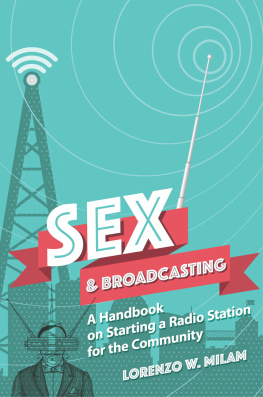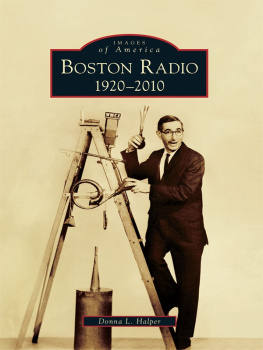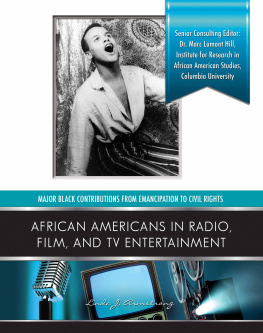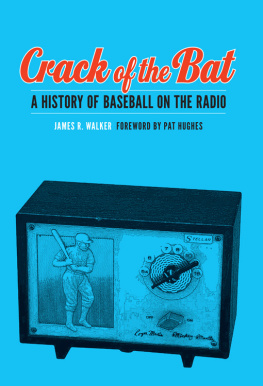The University Press of Mississippi is the scholarly publishing agency of the Mississippi Institutions of Higher Learning: Alcorn State University, Delta State University, Jackson State University, Mississippi State University, Mississippi University for Women, Mississippi Valley State University, University of Mississippi, and University of Southern Mississippi.
www.upress.state.ms.us
The University Press of Mississippi is a member of the Association of University Presses.
Copyright 2019 by University Press of Mississippi
All rights reserved
Manufactured in the United States
First printing 2019
Library of Congress Cataloging-in-Publication Data
Names: Baptiste, Bala J., author. | Ward, Brian, 1961 author.
Title: Race and radio : pioneering black broadcasters in New Orleans / Bala J. Baptiste, foreword by Brian Ward.
Other titles: Race, rhetoric, and media series.
Description: Jackson : University Press of Mississippi, [2019] | Series: Race, rhetoric, and media series | First printing 2019. | Includes bibliographical references and index.
Identifiers: LCCN 2019013311 (print) | LCCN 2019022105 (ebook) | ISBN 9781496822062 (hardback : alk. paper) | ISBN 9781496822079 (pbk. : alk. paper)
Subjects: LCSH: African American radio broadcastersLouisianaNew Orleans. | African Americans in radio broadcastingLouisianaNew Orleans. | Radio broadcastersLouisianaNew Orleans.
Classification: LCC PN1991.4.A2 B37 2019 (print) | LCC PN1991.4.A2 (ebook) | DDC 791.44/08996073dc23
LC record available at https://lccn.loc.gov/2019013311
LC ebook record available at https://lccn.loc.gov/2019022105
British Library Cataloging-in-Publication Data available
FOREWORD
Brian Ward
African American deejay Jockey Jack Gibson once proudly declared that black-oriented radio was the thing that caused the Civil Rights Movement to happen. Of course, no single thing was responsible for creating the Civil Rights Movement of the 1950s and 1960s.1 Nevertheless, other pioneering African American radio announcers and entrepreneurs shared Gibsons belief that black broadcasters had played a vital role in helping cultivate a powerful sense of black identity, pride, and purposefulness that could be leveraged into political action. Some even saw a divine hand at work as the medium took its place alongside black schools, universities, fraternal lodges, unions, and churches at the heart of many black communities and near the vanguard of the freedom struggle. Black radio was God-directed for the salvation of this nation and the world, explained Martha Jean the Queen Steinberg, a veteran of WDIA Memphis and later a station owner in Detroit.2
Participants in the African American freedom struggle during the so-called classic phase of civil rights activism in the 1950s and 1960s were equally convinced of the significance of radio and the influence on the black community of charismatic on-air personalities who drew thousands of listeners to their programs every day. Julian Bond, communications director of the Student Nonviolent Coordinating Committee (SNCC) in the early 1960s, explained that radios speed of response and unique reach and prestige among African Americans made it an especially useful vehicle for activists: If you wanted to get to the large mass of people, you had to go to radio. Radio was what they listened to and radio was where they got their information.3
During the middle decades of the twentieth century, radio station ownership and senior management remained overwhelmingly in white hands. Jesse Blayton was the first African American to own a radio station, when he purchased WERD Atlanta in 1949. Two decades later, at the end of the 1960s, there were still only sixteen black-owned facilities, ten of them located in the South, among the nations 7,350 commercial and noncommercial radio stations.4 Although the whites in positions of power in the industry were often indifferent and sometimes openly hostile to the black struggle for freedom, justice, and equality, their desire to maximize the economic potential of black programming created the environment within which black-oriented broadcasting emerged and flourished. Even in the segregated South, black deejays and a handful of sympathetic white announcers used the airways to showcase black musical and dramatic talent and gave unprecedented airtime to stories of black history and black political, economic, educational, scientific, artistic, and sporting accomplishments. At a time when television was geared primarily to white audiences, black-oriented radio was an invaluable source of local and national news of particular interest to black communities around the nation. Sometimes stations and their staffs were even central to local civil rights activities, as happened during the spring 1963 protests in Birmingham, Alabamaa campaign that is impossible to understand properly without taking into account the role of WENN and WJLD and announcers such as Tall Paul White, Shelley the Playboy Stewart, and Erskine Faush.5
In Atlanta in 1967, Martin Luther King Jr. spoke eloquently of the importance of black-oriented radio in black lives. He noted, with only a modicum of exaggeration, that African Americans were almost totally dependent on radio as their means of relating to society at large. They do not read newspapers television speaks not to their needs but to upper-middle-class America. King had come to appreciate the role which the radio announcer plays in the lives or our people; for better or worse it is important that you remain aware of the power which is potential in your vocation.6
King made these remarks at the annual convention of the National Association of Television and Radio Announcers (NATRA), one of the most dynamic and sometimes controversial of the many organizations that emerged in the later 1960s and early 1970s to try to extend black financial and editorial power within the broadcasting industry, believing black ownership was a vital factor in maximizing the potential of radio to expand black economic, political and social power. NATRAs work highlighted the fact that the broadcasting industry itself was one of many arenas in which the freedom struggle was actually being waged; it was another crucial site of conflict and negotiation between white power and black aspirations, set within the context of the regulatory power of the Federal Communications Commission (FCC).
In sum, black-oriented radio, as a business, as a news medium, as a vehicle for and expression of black culture, and as an institution with the potential for mass mobilization, was somewhere near the epicenter of African American life and politics in the middle decades of the twentieth century. Which begs the question of why, still, relatively little has been written about the topic by historians of the modern African American freedom struggle, or of black culture, community, and enterprise. It is an oversight that the richness of Bala J. Baptistes forensically researched Race and Radio: Pioneering Black Broadcasters in New Orleans makes seem even more egregious. Simply put, anybody who wants to understand the black community and its struggle for respect and empowerment in New Orleans during the mid-twentieth century needs to reckon with this fascinating and revealing book.







